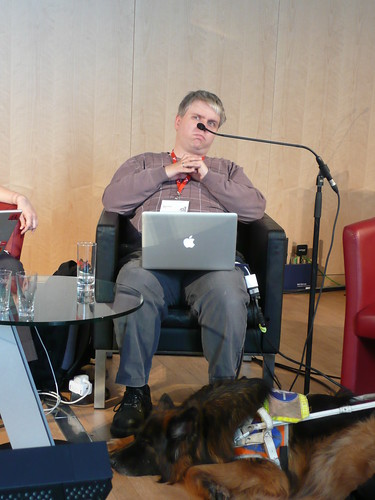I am right now in Santa Clara, California for the end of the year wrap-up and planning sessions of the Yahoo Developer Network. One thing I am realizing is that it is very tough to measure the success or really the impact of what an evangelist does. As my company does not have any commercial programs that tie with the offerings I talk about (all the APIs are free but some are limited to a certain amount of hits per day and there is no way to “buy” more – BOSS is working on that though) I don’t make the company any money.
What I do though is go out there and tell people about the things we have. On the flipside I get feedback from the outside world and see implementations of our work to feed back into the company. This is worth a lot – you cannot determine the quality of a product if you are the one who did it.
This is the same for every evangelist/advocacy role in any of the companies out there. The problem is that when reporting what you’ve done up the hierarchy in a company a lot of things get lost. Measuring the success of a company is a very tough job and it increases with the size of the company. This leads to terrible decisions being made (there will be another post about this here).
As an evangelist/advocate the hardest job is to tell people exactly what your impact was. A lot of what you do is planting mental seeds and inspiring people to work differently – that can’t be measured in hard figures. Other companies measure the success of an event for example by how many business cards were collected and have a department that follows these up by contacting people. I don’t like this much, first of all because a lot of the people I meet don’t have business cards but follow me on twitter instead and secondly because they gave me the card and not the company.
So in order to measure the success of any developer network we need your feedback and success stories of how what we’ve explained and shown has impacted your work. A blog post like this one on Yahoo Pipes makes me happy, as do tweets like this one.
While I am happily scrounging the web for these gems it is annoying that I need to do that. The biggest problem is that people are not commenting any longer. I don’t know why – personally I love to give a comment on where I found out some information. It keeps my concerns and the original message in context. When I twitter my personal view on something the 140 character limit and lack of original text will lead to information loss.
So my wishes from all of you on behalf of all the people in big companies organizing and supporting developer events (yahoo, microsoft, adobe, sun, paypal, ebay…) are following.
If you enjoy free information, swag, being able to directly reach internal experts and being able to network with a select group of like-minded people:
- please leave comments on the blogs/announcement pages of the events (in our case the YDN blog and upcoming – a lot of people only look there and don’t have time to scrounge the web for all the info.
- Use tags we provide at events to tag your photos, blog posts, tweets, videos…
- Tell us about cool implementations and changes in your company based on what we talked about – we are happy to feature those and send you link love and there is nothing cooler than telling the world how someone else but us have done something cool with our stuff
- If you sign up for an event – show up (or send a colleague). I am getting terribly sick of spending a lot of money to hire locations and have 150 sign up to the event in the first 10 minutes – effectively blocking out people that should be there – and then 20 show up! This is wasted time and money – and in the current climate that is not a clever thing to do.
I love my job and I am doing quite extensive work to make the IT industry understand that tech evangelism is not a waste of money but that there is a massive need for it. Marketing and PR departments just cannot reach geeks and internal geeks have neither the drive or the opportunities to talk to the world about the great things they do. I am very sure that innovation and change in IT is not coming from top down but from people who dare to talk to the right people to initiate change. As I put it in my talk at accessibility 2.0 geeks that care are the drivers of innovation and I don’t want to lose the opportunities we have right now.
When I started in IT events were massively expensive and I had to negotiate for months with my managers to get tickets. We are past this – thanks to developer networks and evangelists. I’d hate to see this go and developers falling back to being deliverers and not allowed to go out and play.
